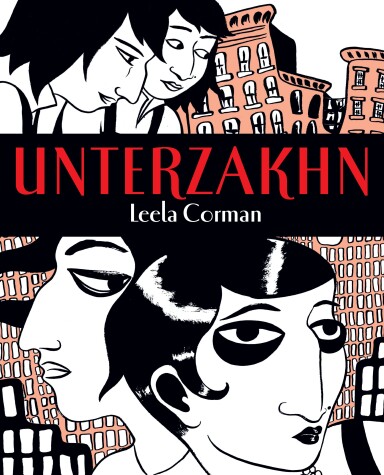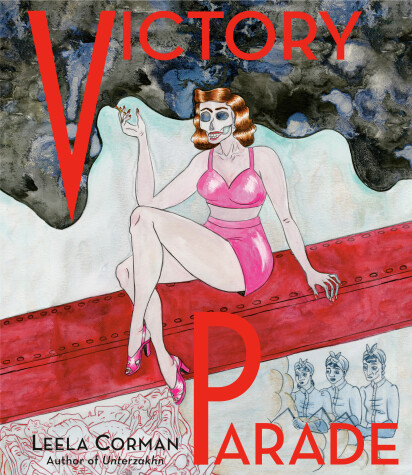Pantheon Graphic Library
2 total works
A mesmerizing, heartbreaking graphic novel of immigrant life on New York’s Lower East Side at the turn of the twentieth century, as seen through the eyes of twin sisters whose lives take radically and tragically different paths.
“A haunting and often heartbreaking look at Eastern European Jewish immigrants in the early 20th century [and] also a story about women, power, and bodies.” —Austin American-Statesman
For six-year-old Esther and Fanya, the teeming streets of New York’s Lower East Side circa 1910 are both a fascinating playground and a place where life’s lessons are learned quickly and often cruelly. In drawings that capture both the tumult and the telling details of that street life, Unterzakhn (Yiddish for “Underthings”) tells the story of these sisters: as wide-eyed little girls absorbing the sights and sounds of a neighborhood of struggling immigrants; as teenagers taking their own tentative steps into the wider world (Esther working for a woman who runs both a burlesque theater and a whorehouse, Fanya for an obstetrician who also performs illegal abortions); and, finally, as adults battling for their own piece of the “golden land,” where the difference between just barely surviving and triumphantly succeeding involves, for each of them, painful decisions that will have unavoidably tragic repercussions.
“A haunting and often heartbreaking look at Eastern European Jewish immigrants in the early 20th century [and] also a story about women, power, and bodies.” —Austin American-Statesman
For six-year-old Esther and Fanya, the teeming streets of New York’s Lower East Side circa 1910 are both a fascinating playground and a place where life’s lessons are learned quickly and often cruelly. In drawings that capture both the tumult and the telling details of that street life, Unterzakhn (Yiddish for “Underthings”) tells the story of these sisters: as wide-eyed little girls absorbing the sights and sounds of a neighborhood of struggling immigrants; as teenagers taking their own tentative steps into the wider world (Esther working for a woman who runs both a burlesque theater and a whorehouse, Fanya for an obstetrician who also performs illegal abortions); and, finally, as adults battling for their own piece of the “golden land,” where the difference between just barely surviving and triumphantly succeeding involves, for each of them, painful decisions that will have unavoidably tragic repercussions.
AN NPR, WASHINGTON POST, GUARDIAN, AND PW BEST BOOK OF THE YEAR • The author of the Eisner-nominated graphic novel Unterzakhn now gives us a heart-wrenching, phantasmagorical tale of love, loss, and trauma both personal and global, set during World War II in Brooklyn, New York, and in the newly liberated Buchenwald concentration camp.
One of a group of women working as welders in the Brooklyn Navy Yard, Rose Arensberg has fallen in love with a disabled veteran while awaiting the return of her husband, Sam, a soldier in the American army serving in Europe. As we follow the bittersweet, heartbreaking stories of Rose and her fellow Rosie-the-Riveters, we're immersed in the day-to-day challenges of life on the home front as seen through the eyes of these resilient women, as well as through the eyes of Eleanor, Rose’s impressionable young daughter, and Ruth, the German Jewish refugee Rose has taken into their home.
Ruth’s desperate attempt to exorcise the nightmare of growing up in pre-war Nazi Germany takes her into the world of professional women wrestlers—with devastating consequences. And Sam’s encounters with the horrors of a liberated concentration camp follow him home to Brooklyn in the form of terrifying flashbacks that will leave him scarred forever.
Victory Parade paints a deeply affecting portrait of how individuals and civilizations process mass trauma. Magnificently drawn by Leela Corman, it’s an Expressionist journey through the battlefields of the human heart and the mass graves of genocide.
One of a group of women working as welders in the Brooklyn Navy Yard, Rose Arensberg has fallen in love with a disabled veteran while awaiting the return of her husband, Sam, a soldier in the American army serving in Europe. As we follow the bittersweet, heartbreaking stories of Rose and her fellow Rosie-the-Riveters, we're immersed in the day-to-day challenges of life on the home front as seen through the eyes of these resilient women, as well as through the eyes of Eleanor, Rose’s impressionable young daughter, and Ruth, the German Jewish refugee Rose has taken into their home.
Ruth’s desperate attempt to exorcise the nightmare of growing up in pre-war Nazi Germany takes her into the world of professional women wrestlers—with devastating consequences. And Sam’s encounters with the horrors of a liberated concentration camp follow him home to Brooklyn in the form of terrifying flashbacks that will leave him scarred forever.
Victory Parade paints a deeply affecting portrait of how individuals and civilizations process mass trauma. Magnificently drawn by Leela Corman, it’s an Expressionist journey through the battlefields of the human heart and the mass graves of genocide.

